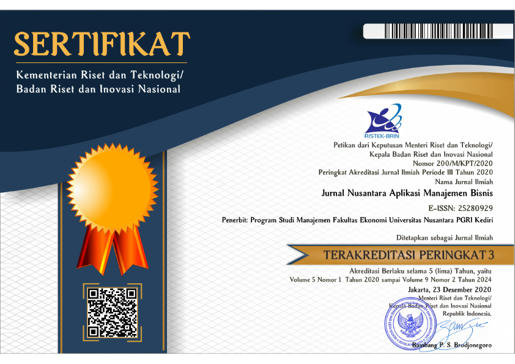Analisis Implementasi Sifat Rasulullah dalam Pengelolaan Zakat
DOI:
https://doi.org/10.29407/nusamba.v5i2.14881Keywords:
Key Words : the character of Muhamamad, Management of ZakatAbstract
This study aims to discuss implementation the characteristic of Muhammad in the management of zakat carried out by the Amil Zakat Board in Sukabumi City. This research uses a descriptive method with a qualitative approach. The results of this study indicate that the National Amil Zakat Board of Sukabumi City has implemented the characteristics of the Muhammad such as shidiq, amanah, tabligh, and fathanah in the management of zakat. This implementation is very important to be applied by every amil zakat because in the management of zakat the relationship is not only with humans but also with Allah SWT.
Downloads
References
Al-Qur’an dan terjemahannya. 2009. Departemen Agama RI. Jakarta : Sygma exagrafika
Aji Maulana. (2008). Implementasi Konsep Amanah dan Fathanah pada Pengelolaan Zakat Badan Amil Zakat Nasional. UIN Syarif Hidayatullah.
Erie Sudewo. (2012). Manajemen ZIS “Profesionallah agar Tak Terus Terbetot di Kubangan Tradisi, Potensi, dan Wacana.” (Y. Maulana, Ed.) (1st ed.). Jakarta: IMZ.
Gunawan, K. (2017). Pelayanan Lembaga Zakat Untuk Meningkatkan Kepuasan Muzakki. Jurnal Zakat Dan Wakaf, 4(2).
Kusoy. (2020). Sukabumi.
Marlia Asmarani, R. K. (2019). Akuntabiitas lembaga amil zakat dalam perspektif maqasidh syariah : studi pada yayasan dana sosial al-falah surabaya. Jurnal Akuntansi Unesa, 8.
Sudiana, N. (2016). Sertifikasi Amil Zakat.
Sugiyono. (2017). Metode Penelitian Kuantitatif, Kuallitatif, dan R&D. Bandung: ALPABETA.
Sutardi, Muhammad Irwan, D. I. R. (2017). Implementasi Kaida-kaidah islam dalam pengelolaan zakat profesi. Al Masraf: Jurnal Lembaga Keuangan Dan Perbankan, 2(1).
Downloads
Published
Issue
Section
License
Authors who publish with this journal agree to the following terms:
- Copyright on any article is retained by the author(s).
- The author grants the journal, the right of first publication with the work simultaneously licensed under a Creative Commons Attribution License that allows others to share the work with an acknowledgment of the work’s authorship and initial publication in this journal.
- Authors are able to enter into separate, additional contractual arrangements for the non-exclusive distribution of the journal’s published version of the work (e.g., post it to an institutional repository or publish it in a book), with an acknowledgment of its initial publication in this journal.
- Authors are permitted and encouraged to post their work online (e.g., in institutional repositories or on their website) prior to and during the submission process, as it can lead to productive exchanges, as well as earlier and greater citation of published work.
- The article and any associated published material is distributed under the Creative Commons Attribution-ShareAlike 4.0 International License












